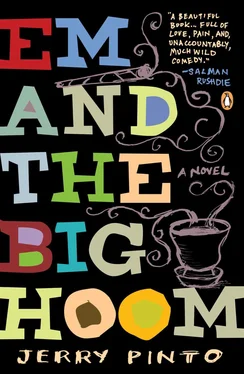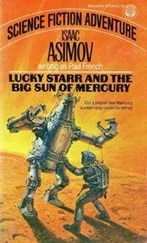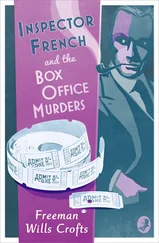Jerry Pinto - Em and the Big Hoom
Здесь есть возможность читать онлайн «Jerry Pinto - Em and the Big Hoom» весь текст электронной книги совершенно бесплатно (целиком полную версию без сокращений). В некоторых случаях можно слушать аудио, скачать через торрент в формате fb2 и присутствует краткое содержание. Год выпуска: 2014, Издательство: Penguin Books, Жанр: Современная проза, на английском языке. Описание произведения, (предисловие) а так же отзывы посетителей доступны на портале библиотеки ЛибКат.
- Название:Em and the Big Hoom
- Автор:
- Издательство:Penguin Books
- Жанр:
- Год:2014
- ISBN:нет данных
- Рейтинг книги:3 / 5. Голосов: 1
-
Избранное:Добавить в избранное
- Отзывы:
-
Ваша оценка:
- 60
- 1
- 2
- 3
- 4
- 5
Em and the Big Hoom: краткое содержание, описание и аннотация
Предлагаем к чтению аннотацию, описание, краткое содержание или предисловие (зависит от того, что написал сам автор книги «Em and the Big Hoom»). Если вы не нашли необходимую информацию о книге — напишите в комментариях, мы постараемся отыскать её.
Em and the Big Hoom — читать онлайн бесплатно полную книгу (весь текст) целиком
Ниже представлен текст книги, разбитый по страницам. Система сохранения места последней прочитанной страницы, позволяет с удобством читать онлайн бесплатно книгу «Em and the Big Hoom», без необходимости каждый раз заново искать на чём Вы остановились. Поставьте закладку, и сможете в любой момент перейти на страницу, на которой закончили чтение.
Интервал:
Закладка:
• • •
Em would tell us that she liked being a schoolteacher, and from memories I have of Em combing a young patient’s hair in her hospital ward, or feeding the old lady in the bed next to hers as she would feed an infant, I can believe this. But her first day as a teacher nearly destroyed her. Schoolchildren can smell a nervous teacher. They see it in her gait as she enters the room, uncertain of her ability to command and instruct. They hear it in her voice as she clears her throat before she begins to speak. They sense it when she looks at the teacher’s table and chair, set on a platform to give her a view of the class, as if she has no right to be there. They watch without remorse or sympathy as she walks the gauntlet and suddenly they are in the grip of a completely new sensation. It is power that they are feeling as they anneal into a single organism: the class. At any moment now, they will cry havoc and let slip the dogs of war. Every schoolchild has felt that collective rill of joy trickle down his throat as the hierarchy breaks down and revenge may be had.
‘I think Mother Superior meant well,’ Em remembered. ‘But she made a fatal mistake. She came and introduced me and said that I was the new teacher and that it was my first day at teaching. She said she knew what well-behaved children they were and how they would help me. For a few minutes after she left, they tolerated me. Or they held themselves back. I remember trying to think what teachers did or said. No one had even told me what I was supposed to be teaching. I asked what period it was and the class shouted back in one voice, “Mathematics.” I almost wept, because I hated mathematics and now it seemed I was supposed to be teaching it. In the next five minutes, they were ready. All of them had pieces of paper under their feet. They began rubbing them on the floor. Khuzzz. Khuzzz. Khuzzz. I said, “Please don’t do that,” or something. I knew it wasn’t the right thing to say. I knew I sounded weedy. But that was all I could manage.’
‘Gosh,’ I said, feeling a pang of guilt. The future sins of the son had been visited on the mother. How many times had I helped do this to a new teacher?
‘They all chorused, “So-rry tea-cher.” I said, “That’s all right.” They chorused, “Than-kyou tea-cher…” I can still hear their voices, the dirty little shits, though I came to love them later, but they were still dirty little shits… and then they began singing “Happy birthday” to me.’
‘What did you do?’
‘I ran out of the class crying.’
‘What?’
‘I was terrified. I just wanted to hide somewhere so I thought I’d hide in a toilet. Only, it was the boys’ toilet.’
‘Oh God.’
‘Luckily, it was empty. Then I found the staffroom by mistake and Mother Superior was there, examining workbooks or something. She made me wash my face and then she took me back to class. She made the class kneel down on their desks and pray for forgiveness to the benevolent God who had allowed them to be born in families that sent them to school.’
‘The Hindus and Muslims too?’
‘Everyone. Then they had to write a letter of apology to their parents. She was quite, quite brilliant, Mother Soup.’
‘Who were you teaching?’
‘Seventh standard. I think she assumed I couldn’t do too much damage there. I must have been a terrible teacher because I didn’t understand any of the stuff I was teaching. Each day I’d ask Daddy what to say about integers or fractions or ratio and proportion and I would read it out slowly in class. Then I would make a clever boy come up to the blackboard and do the sums.’
‘Wow,’ I said.
‘What does that mean? No, don’t bother telling me. As if I don’t know. But what could I do? I didn’t understand ratio and proportion. The numbers seemed to skip about, some went up and some went down and nothing seemed to work out. But after a year, they gave me English and history. I was so happy I could have danced.’
But at the end of six months, Granny arrived in Mother Soup’s office. Her daughter was now eighteen years old and she was no longer going to work at the school. She wouldn’t teach anymore, but learn. She would join the Standard Shorthand and Typewriting Institute.
‘“We set the standard”, that was their motto. Mae said it was the right thing for me to do. Someone must have told her that secretaries make more money. Or something like that. So she decided that I would become a secretary.’
‘Did she ask you?’
Em gave me a speaking look.
‘I was so unhappy I wept almost all the time. I remember a couple of my students passing me on the street and saying, “Good morning, Miss” and I burst into tears. I remember crying because I didn’t think I would ever be able to change a typewriter ribbon without getting my fingers dirty. I remember crying because I didn’t understand tabs. And just when I had started to understand the typing thing, the shorthand started and the typing seemed like easy butter-jelly-jam. Typing was about getting English out of a machine. Shorthand was a new language and it was terrible, full of chays and jays and things like that. I can’t tell you how much I cried.’
How to read those tears would always be a problem. For anyone else, they would be the outpourings of an eighteen-year-old forced out of a world she had grown to enjoy into a new one. But each time Em told me something about her life, I would examine it for signs, for early indications of the ‘nervous breakdown’. It was an obsession and might have something to do with my curiosity about her life. She was born in Rangoon, I knew, and had come to India on one of the ships that crossed the Bay of Bengal when the Japanese attacked Burma. Her father had walked, from Rangoon to Assam; legend has it that he had departed with a head of black hair and appeared again in Calcutta with a shock of white hair. Was this it? Was this the break? She didn’t seem to remember much about that crossing except how she used orange sweets to quell her nausea and began menstruating on board the ship. Was this just how people remembered things, in patches and images, or was this the repression of a painful memory?
Somewhere along the way their piano had been jettisoned to lighten the boat. When I first heard this, I thought it was a good place for things to start, for my mother’s breakdown to begin. I imagined the dabbassh as the piano hit the water with, perhaps, a wail of notes. I imagined my mother weeping for the piano as it began to bubble its way to the bottom of the Bay of Bengal. I cut between her tears, the white handkerchief handed to her by her impatient mother, the plume of dust rising from the seabed, the tear-soaked face, the first curious fish…
Then I heard another Roman Catholic Goan family speak of their piano. And another. And a fourth. Then I got it. The pianos were a metaphor, a tribal way of expressing loss. It did not matter if the pianos were real or had never existed. The story was their farewell to Rangoon. It expressed, also, their sense of being exiled home to Goa, to a poor present. The past could be reinvented. It could be rich with Burmese silk and coal mines and rubies and emeralds and jade. It could be filled with anything you wanted and a piano that was thrown overboard could express so much more than talking about how one lent money out at interest in the city. Or how one taught English to fill up the gaps of a schoolteacher’s salary.
The family had come to Goa and then to Bombay. They had lived in a single room that would later become a laundry before Em’s father found a job as a mathematics teacher. Was that it? The years of deprivation? Only, it didn’t seem to be much more deprivation than many young women of the time endured. Was it the sacrifice of her teaching job, then? Hundreds of women had sacrificed the same or more. Every fact, every bit of information had to be scanned. Sometimes it was exhausting to listen to her because she seemed to be throwing out clues faster than I could absorb them.
Читать дальшеИнтервал:
Закладка:
Похожие книги на «Em and the Big Hoom»
Представляем Вашему вниманию похожие книги на «Em and the Big Hoom» списком для выбора. Мы отобрали схожую по названию и смыслу литературу в надежде предоставить читателям больше вариантов отыскать новые, интересные, ещё непрочитанные произведения.
Обсуждение, отзывы о книге «Em and the Big Hoom» и просто собственные мнения читателей. Оставьте ваши комментарии, напишите, что Вы думаете о произведении, его смысле или главных героях. Укажите что конкретно понравилось, а что нет, и почему Вы так считаете.











